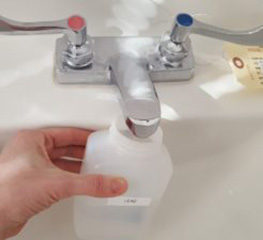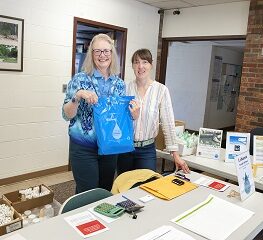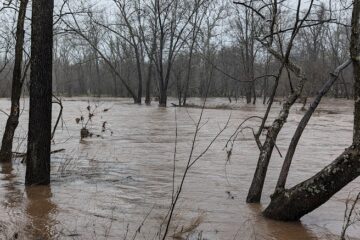 If your household gets drinking water from a well, how do you know it’s safe and free from contaminants? You don’t, unless you get it tested!
If your household gets drinking water from a well, how do you know it’s safe and free from contaminants? You don’t, unless you get it tested!
Raritan Headwaters Association (RHA), the region’s nonprofit watershed watchdog, is working to make well testing easier and more convenient for the approximately 60,000 households in the Upper Raritan River Watershed that depend on privately-owned wells.
“Four out of five households in our watershed – which includes parts of Hunterdon, Somerset, and Morris counties – use well water,” said Mara Tippett, Associate Director of RHA. “It’s very important for residents with wells to make sure the water they and their families are drinking is safe by getting it tested.”
She added that residents with either well water or public water who are concerned about the possibility of lead contamination from old pipes and fixtures in their homes can get their water tested.
For decades, RHA has offered well water testing at discounted prices from a certified laboratory. Test kits can be purchased year-round at the organization’s offices in Bedminster and Flemington.
Each fall and spring, Tippett noted, RHA tries to make well testing extra convenient by scheduling “community” well testing events in municipalities throughout the watershed. This fall, special testing dates will be held in nine towns.
“You don’t need to be a resident of those towns to get your water tested there,” emphasized Tippett. “Community well testing events are open to everyone. We want to protect the public’s health, so we try to make testing as simple and accessible as possible.”
Community well testing events will be held in the following towns this fall. Full details on each event and the option to register online may be found at www.testmywell.org.
Delaware Township – Wednesday, Sept. 21, 5 – 7 p.m.; and Saturday, Sept. 24, 9 a.m. – noon at Delaware Town Hall;
Raritan Township – Monday, Sept. 19, through Friday, Sept. 30 (weekdays), 8:30 a.m. – 4:30 p.m. at the Raritan Municipal Building;
Lawrence Township – Sunday, Oct. 2, noon – 3 p.m. at Lawrence Central Park;
Kingwood Township – Saturday, Oct. 8, 9 a.m.-noon; Tuesday, Oct. 11, 5 – 7 p.m.at Kingwood Twp. Municipal Building;
Readington Township – Saturday, Oct. 15; Tuesday, Oct. 18; Wednesday, Oct. 19 and Tuesday, Oct. 25 at Three Bridges Fire Co. and Readington Municipal Building (times and locations vary, see RHA website for details);
Mendham Township – Saturday, Oct. 22, 9 a.m. – noon. at Brookside Community Club;
Hillsborough Township – Saturday, Oct. 29, 9 a.m. – noon at the Hillsborough Municipal Complex;
Tewksbury Township – Monday, Oct. 24, through Tuesday, Nov. 1 (weekdays) 8 a.m. –- 3:30 p.m. at the Tewksbury Township Administration Building;
Bethlehem Township – Tuesday, Nov. 8, 9 a.m. – 7 p.m. and Saturday, Nov. 12, 9 a.m. – noon at the Bethlehem Municipal Building;
What Tests Are Available?
 Tests are available for a variety of potential water contaminants. The basic kit tests for coliform bacteria and nitrates, two important indicators of drinking water quality that should be tested for once every year. Testing is also available for arsenic, lead, volatile organic chemicals, radon, uranium, and other contaminants.
Tests are available for a variety of potential water contaminants. The basic kit tests for coliform bacteria and nitrates, two important indicators of drinking water quality that should be tested for once every year. Testing is also available for arsenic, lead, volatile organic chemicals, radon, uranium, and other contaminants.
Tippett noted that because of this past summer’s drought, local wells may be at added risk of arsenic contamination. Arsenic is a metal that occurs naturally in bedrock and sediments, and more arsenic can be released into groundwater during drought conditions. “No amount of arsenic is considered safe in drinking water,” she said, “and arsenic is quite prevalent throughout central New Jersey.”
New this year, said Tippett, is the option to test for PFAS (per- and polyfluoroalkyl substances, also known as the “forever chemicals”) a class of chemicals found in non-stick cookware, water-repellent clothing, stain-resistant carpets and fabrics, some firefighting foams, and treated sludge, known as biosolids, that are applied to farm fields as fertilizers.
Because the Upper Raritan Watershed includes many agricultural areas, Tippett said, PFAS contamination has been found in areas near farms that may be using biosolids. “We’re finding contamination in rural areas where we wouldn’t have expected it,” she said.
Another new offering this year is testing for glyphosate, the active chemical found in the herbicide Roundup. “We do not have much data at this point about whether glyphosate is a significant groundwater contamination issue for our watershed so the data collected this year will be an important first step in determining the presence of contamination,” she said.
Well Contamination Mapping
To help residents decide which contaminants to test for, Raritan Headwaters earlier this year released an interactive map of where contaminants have been found as a result of well testing.
“We took 10 years of test results – from 2011 through 2020 – and mapped all the data points,” Tippett explained. “Using our maps, local residents can see what contaminants are most common in their neighborhoods, learn about sources and prevention, and get guidance on testing frequency.”
The new RHA maps – available at www.raritanheadwaters.org/well-water-map/ – divide the 470-square-mile watershed into a grid of one-square-mile areas. Each hexagon-shaped cell is color-coded to show what level of contamination was detected in well tests. Separate maps were created for each common contaminant.
For more information about RHA’s well testing program, including how to pre-order tests online, go to www.testmywell.org.



